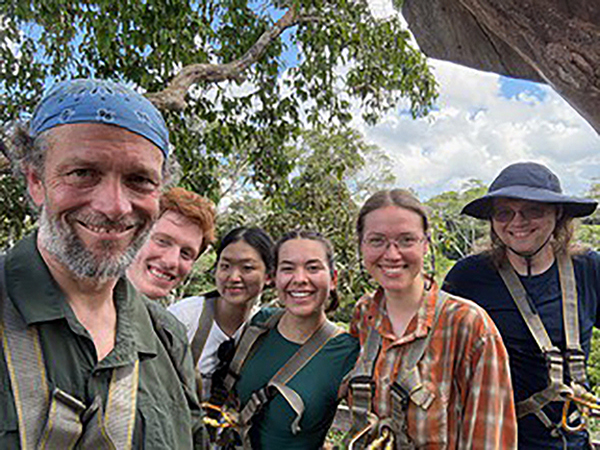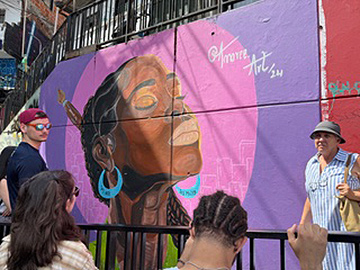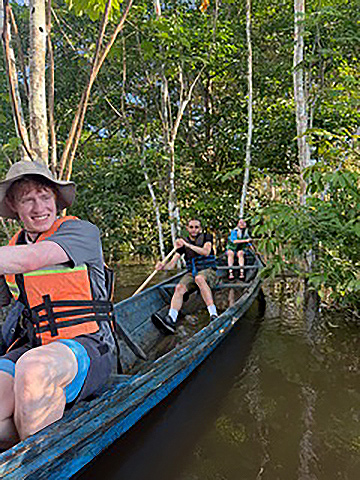
07/01/2025
Can conservation and a growing economy mix? SUNY Cortland students crossed a continent to examine the question firsthand during the university’s first-ever study abroad trip to Colombia.
The two-week visit, Colombia: Ecologies, Economies, and Culture, brought seven students, including four from Cortland, to three regions in the country with distinct academic goals:
- Central Andes: Students worked with the local population and made connections between local conservation efforts and sustainable economies.
- Amazonas: Participants examined the ways that successful ecotourism can reduce resource extraction in a region.
- Medellín: Students focused on innovative urban development.
As part of the program, each student wrote a paper on their experience and earned three credits for the Special Topics in Economics class.

The travel group examines a mural while in Colombia.
Associate Professor Ben Wilson, chair of the Economics Department, led the trip with Tompkins Cortland Community College’s (TC3) Kelly Wessell, professor in biology, and Jorge Orejuela, an adjunct assistant professor at TC3 and, in Colombia, the director of Cali Botanical Garden and a professor in the environmental sciences department at the Universidad Autónoma de Occidente.
Wilson noted that Wessell and Orejuela had run the program at TC3 for more than a decade and that Cortland was able to join this year thanks to the efforts of the university’s International Programs Office.
“I have worked with Dr. Wessell on a couple of other projects including my Adirondack Economies course that takes place up at Raquette Lake,” Wilson said. “We have wanted to bring that type of interdisciplinarity to the Colombia trip for some time now.”
Colombia is the second most biodiverse country in the world, according to the World Wildlife Fund. That landscape has created a growing interest from tourists. As visitors increase, so does the importance of the question: can this new industry expand and benefit the country while current communities and ecosystems stay healthy?
The trip of more than 2,500 miles to Latin America let the group learn and grow in ways that can’t be duplicated in a classroom, according to Wilson.

He described the students who made the trip as “curious, kind and energetic.” They embraced going outside their comfort zones in challenges that included swimming the Amazon River, hiking in mountains and rain forests, and navigating Medellin’s vibrant urban environment.
“The immense scale of the Andes Mountains, the smell of an Amazonian fish market or fresh arepas cooking in the streets, canoeing in the Amazon River, picking and roasting coffee beans before drinking an espresso, watching break dancing in Medellín’s Comuna 13 and learning about the city’s extraordinary transformation through public art,” Wilson said of the sensory experiences that helped bring their academic studies to life.
It was not just the cultural and environmental diversity that made Colombia an ideal spot for the course. Orejuela’s family owns property in the Central Andes named La Dicha — The Bliss — a private nature reserve that hosted the group and gave a unique view of the country.
“Here they have regenerated a cloud forest, built a permaculture farm and coffee growing system, and built an art lab that highlights the intersections of indigenous life and culture with the environment,” Wilson said.
That the students were so warmly welcomed by a family full of knowledge and passion for their home area was inspiring, he added.
The trip is expected to be offered again at SUNY Cortland in May of 2027. In the meantime, Wilson said that the Economics Department also has study abroad connections with Fulda University in Germany and other schools in Turkey. But he recommends that students learn more about the school’s International Programs Office and find out what options stand out the most — wherever that may take them.
“Studying abroad touches all your senses and changes your being,” Wilson said. “It is an experience that cannot be undervalued. It will change you forever. Part of this is the bonds you will create with your classmates and the places you visit. It is simply a magical way to learn.”






